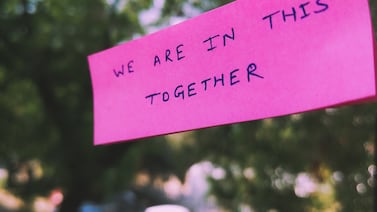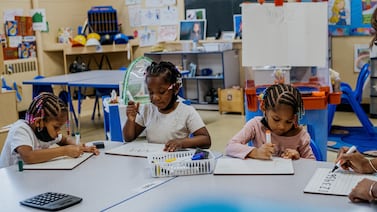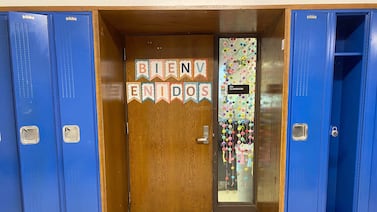When the Johnstown-Milliken district launched what officials there call Cloud School, participation was relatively high, with roughly 85% of elementary students and 70% of middle school students regularly logging on, joining live lessons, and completing assignments.
But over time, enthusiasm flagged. Sometimes just four or five students showed up to a class, particularly at the middle school level.
So the northern Colorado district launched a campaign: #FinishStrong. Students who participated in a certain amount of remote learning, such as joining Zoom calls or completing assignments, during the first two weeks of May could earn a T-shirt that would entitle them to fun activities such as pep rallies, dances, sporting events, and recognition on social media next school year.
“It will be important for your child to engage now so that recognitions, celebrations, and special events are opened up to him/her this summer and fall!” Superintendent Leslie Arnold wrote in an email to parents in late April.
“We were trying to give the kids something fun to participate in and be able to say, ‘yeah, I survived this,’” Arnold said in an interview this week.
But the idea hasn’t struck everyone as fun.
Veronica Salvador, a parent in the Johnstown-Milliken district and a teacher in another district, said she worries about students whose parents can’t stay home with them or who don’t have good internet access, students who don’t speak English well, and students with disabilities whose parents struggle to help them through the school day.
“This whole pandemic has brought out a lot of things that are inequitable that we do in schools, and this is one of them,” she said. “To me, it’s penalizing kids for things that are outside of their control.”
She thinks especially about one of her neighbors who is raising a grandson with serious emotional challenges.
“If he doesn’t get the shirt, he’ll really struggle,” she said.
From attendance awards to pizza parties for students who complete standardized tests, incentive programs in school are nothing new. Nor is debate about whether they’re fair or effective. In 2018, the Colorado legislature went so far as to ban the practice of rewarding students for taking standardized tests. The arrival of coronavirus renewed concern that perfect attendance awards encourage students to come to school sick.
Arnold said the district tried to make it easy for students to earn the shirt, while still having it be a meaningful accomplishment. Students also have the option of doing paper assignments — about a third of all elementary students are doing their work this way — and students whose parents reached out to tell teachers about particular challenges can still earn the shirt.
Arnold believes most students will earn the shirt, but she acknowledges that some will not.
More broadly, Arnold said school leaders and district officials are trying to figure out how to motivate students in a remote environment. Like many districts, Johnstown-Milliken took a “hold harmless” approach to grades, in which students could improve their grades but couldn’t lose points. High school seniors trying to make up credits were highly engaged, but those who left for spring break with good grades were not. Stressed-out parents of younger students decided it wasn’t worth the fight to get their children to do the work.
“For years and years, you heard that grades were not what motivated kids,” Arnold said. “Now we’re hearing, ‘If it’s not graded, why should we do it?’”
“So we’re scratching our heads, and we do think it’s a combination. Students and parents want to know what the expectations are for accountability.”
Ideally, students would learn for the sake of learning, Arnold said. And across the 3,800-student district, the teachers with the best engagement are those with the best relationships with their students. The district is surveying families about their experiences and thinking about how to keep engagement strong if remote learning continues into the fall.
In the meantime, the incentive program felt like a good experiment to get students’ attention, Arnold said.
The incentive was announced on a weekend, and the following Monday, participation in Cloud School surged to 90%, Arnold said.
By the end of the two-week period, it had drifted back down to 70%.








